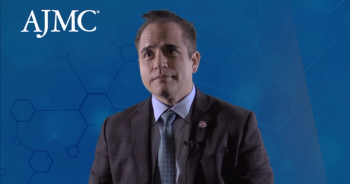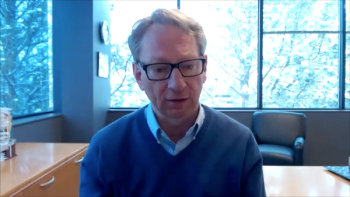
Robert Sidbury, MD, MPH, chief, Division of Dermatology, Seattle Children's Hospital, spoke on considerations for dermatologists in seeking payer coverage of novel, expensive therapies for atopic dermatitis.

Matthew is an associate editor for The American Journal of Managed Care® (AJMC®). He joined AJMC® in 2019 and creates content for Medical World News®, a 24-hour online program developed MJH Life Sciences® focusing on pressing topics within managed care, as well as the nonwork-related activities of health care stakeholders.
He has a BA in journalism & media studies and economics from Rutgers University. You can connect with Matthew on LinkedIn.

Robert Sidbury, MD, MPH, chief, Division of Dermatology, Seattle Children's Hospital, spoke on considerations for dermatologists in seeking payer coverage of novel, expensive therapies for atopic dermatitis.

Angela Storseth-Cooper, associate director, Government Relations & Public Policy, The US Oncology Network, discusses state-level legislation that community oncology practices can leverage to address issues involving pharmacy benefit managers and the vertical integration of health plans and specialty pharmacies.

Lower risk of discontinuation was found with ustekinumab vs the biologics adalimumab, secukinumab, and ixekizumab, in the treatment of patients with moderate to severe psoriasis.

Sublingual immunotherapy with Dermatophagoides pteronyssinus extract was associated with significant improvements in disease severity among patients with atopic dermatitis sensitized to the house dust mite.

Patients with chronic rhinosinusitis (CRS) with nasal polyps exhibited significant improvement in olfactory function when treated with a combination of oral and nasal steroids vs nasal steroids alone.

At the 2022 Community Oncology Conference, Elizabeth Spurlock, MA, PHR, director, Human Resources Business Partner, Texas Oncology, discussed the prevalence of burnout among physicians, staff, and administrators, and several strategies to reduce risk and support the health care workforce.

Taiwanese patients with psoriasis were found to be at greater risk of developing gout; nonsteroidal anti-inflammatory drug use was shown to decrease such risk.

Emerging research on therapeutics and practical approaches to managing a myriad of dermatological conditions, as well as a growing focus on diversity, equity, and inclusion will be explored at the 2022 American Academy of Dermatology (AAD) Annual Meeting, which will take place March 25-29, in Boston, Massachusetts.

Lalan Wilfong, MD, vice president of Payer Relations & Practice Transformation at The US Oncology Network, speaks on how use of health economics and outcomes research has benefitted patient care in the community oncology setting and where it can be further leveraged in the pursuit of value-based care.

Jim Schwartz, RPh, corporate pharmacy manager, Texas Oncology, discussed pharmacy challenges regarding equitable care and distribution of specialty drugs in the community oncology setting.

Ben Jones, vice president, Government Relations & Public Policy, The US Oncology Network, addresses potential reform at the federal and state level that could accelerate the pursuit of value-based care in the community oncology setting.

Michael Diaz, MD, president and managing physician, Florida Cancer Specialists & Research Institute, speaks on takeaways from his discussions on site of care and pharmacy benefit managers (PBMs) at the 2022 Community Oncology Conference.

The study called for increased education, productive health care professional dialogue, and shared decision-making in the management of patients with psoriasis and psoriatic arthritis.

Along with common symptoms of itch and pain, patients with atopic dermatitis experience significant work productivity and attention issues that affect overall quality of life, said Robert Sidbury, MD, MPH, chief, Division of Dermatology, Seattle Children's Hospital.

FDA issued a complete response letter (CRL) to AstraZeneca seeking additional clinical data for benralizumab, sold as Fasenra, in the treatment of patients with inadequately controlled chronic rhinosinusitis with nasal polyps.

Longer-term findings of the Measure Up 1 and 2 studies showed the JAK inhibitor upadacitinib to be safe and effective after 52 weeks in the treatment of adults and adolescents with moderate to severe atopic dermatitis.

Cardiac troponin I (cTnI) and N-terminal pro-brain-type natriuretic peptide (NT-proBNP) were associated with incident cardiovascular events in patients with psoriatic disease.

Kashyap Patel, MD, chief executive officer, Carolina Blood and Cancer Care Associations, and current president of the Community Oncology Alliance (COA), previews his discussion on health equity to be held at the 2022 Community Oncology Conference.

Patients with chronic rhinosinusitis (CRS) with severe radiographic disease were more likely to report incidence of nasal polyps and be managed by endoscopic sinus surgery, but did not show greater health care utilization.

Robert Sidbury, MD, MPH, chief, Division of Dermatology, Seattle Children's Hospital, discussed the psychosocial and behavioral issues faced by patients with atopic dermatitis, particularly those with severe disease.

Glenn Balasky, executive director of Rocky Mountain Cancer Centers, previewed topics and potential takeaways from his discussion on building a community oncology practice for the future at the 2022 Community Oncology Conference.

Soumya Chakravarty, MD, PhD, FACP, FACR, strategic lead, Rheumatology Therapeutic Area at Janssen, spoke on adverse patient outcomes caused by diagnostic delays in psoriatic arthritis and progress made to address this unmet need.

David Penberthy, MD, MBA, medical director of radiation oncology at Southside Regional Medical Center, discusses his theme as president-elect of the Association of Community Cancer Centers (ACCC) and what initiatives and discussions he looks forward to addressing over the next year.

Reasons for pursuing genomic profiling among patients with advanced bladder, renal, and prostate cancers included guiding treatment and improving treatment response, in which age and education level were found to significantly influence shared decision-making.

Dupilumab was shown to significantly improve factors of skin barrier function, including transepidermal water loss, lipid composition, and filaggrin, among patients with moderate to severe atopic dermatitis.

Patients with chronic rhinosinusitis with nasal polyps (CRSwNP) who have comorbidities were more likely than those without co-occuring conditions to require revision endoscopic sinus surgery over a 10-year period.

Japanese patients with psoriasis reported improved objective symptoms and satisfaction with brodalumab.

In Poland, the prevalence of chronic rhinosinusitis with nasal polyps was shown to be greater in men, elderly individuals, and those living in urban areas.

Patients with severe atopic dermatitis showed significant associations with concomitant contact dermatitis and immune dysfunction after undergoing a multidisciplinary evaluation between allergy, immunology, and dermatology specialists.

Soumya Chakravarty, MD, PhD, FACP, FACR, strategic lead of the Rheumatology Therapeutic Area at Janssen, discussed the interlinked pathophysiology of psoriasis and psoriatic arthritis, and the involvement of inflammatory mediators for both conditions.

259 Prospect Plains Rd, Bldg H
Cranbury, NJ 08512
© 2025 MJH Life Sciences®
All rights reserved.
